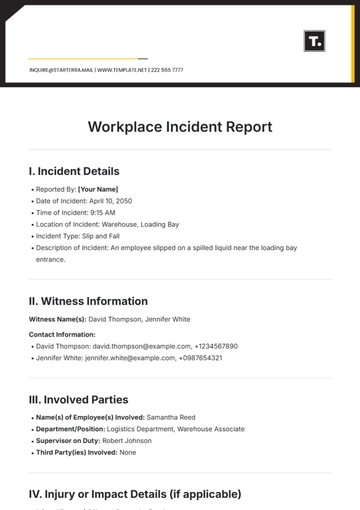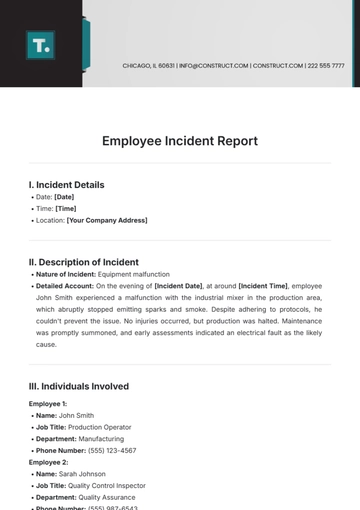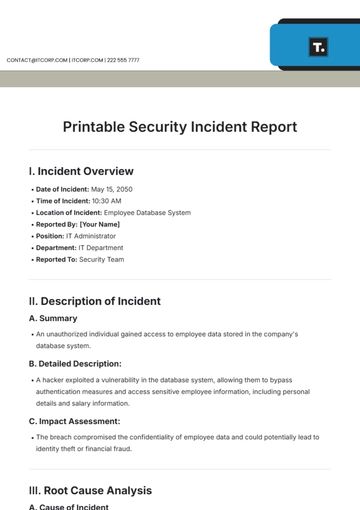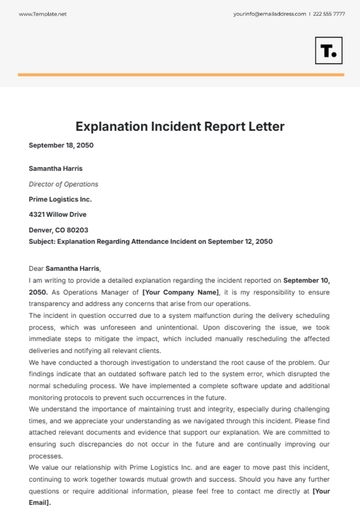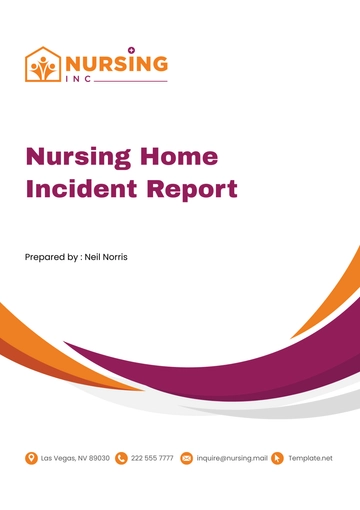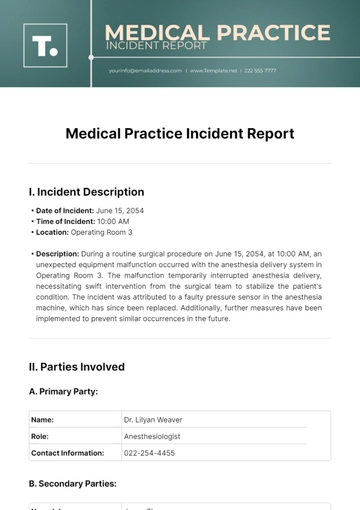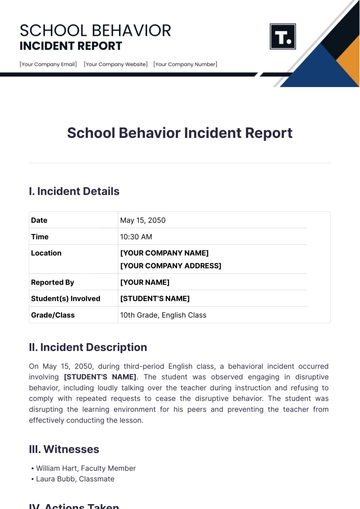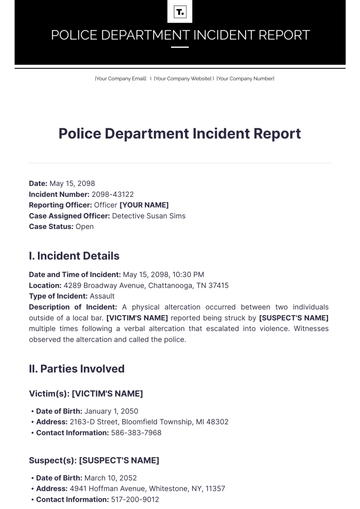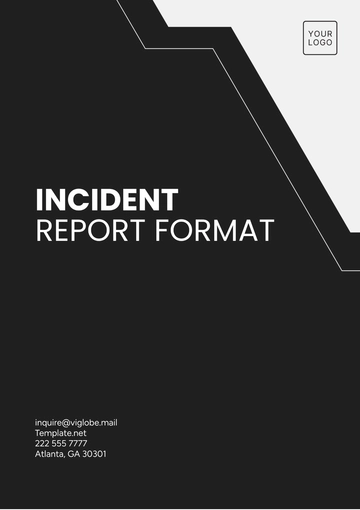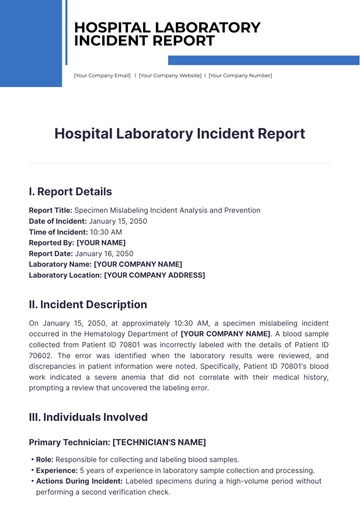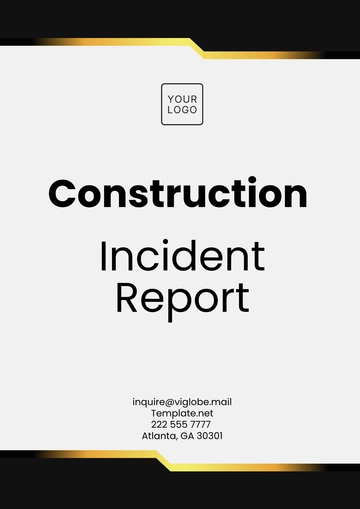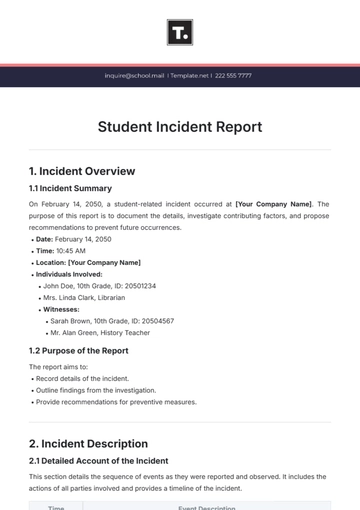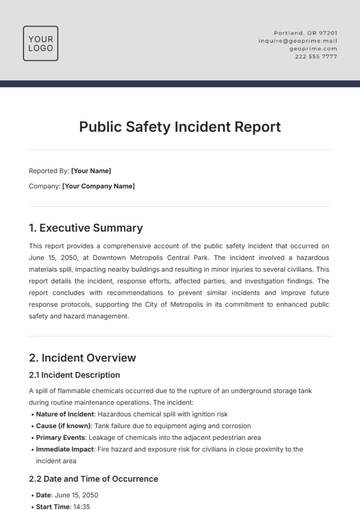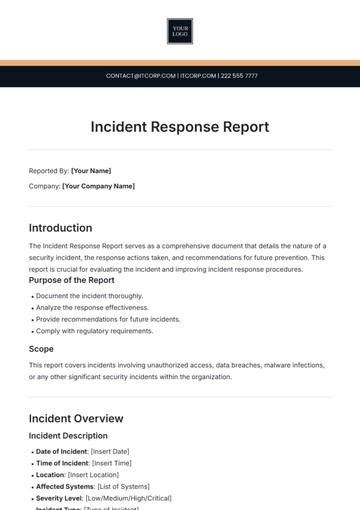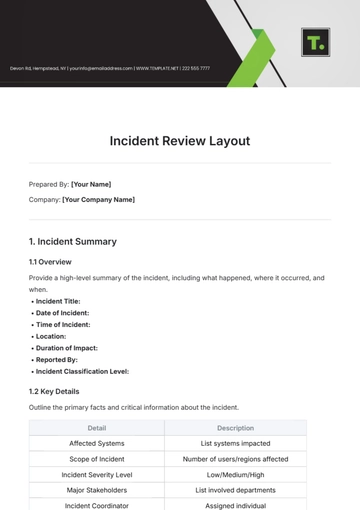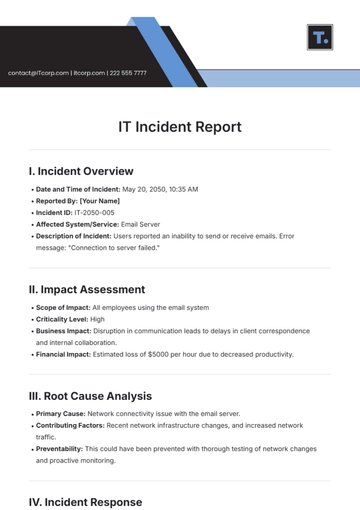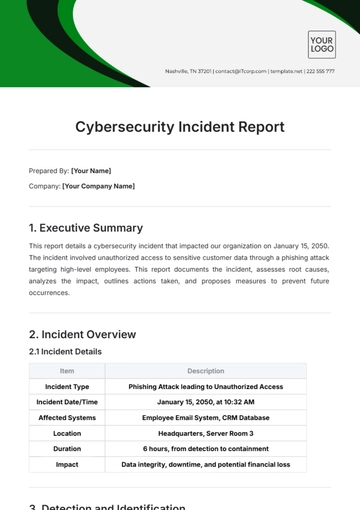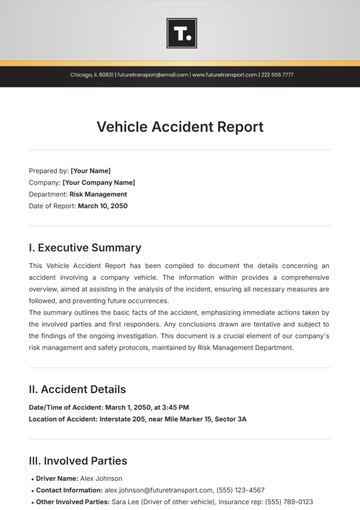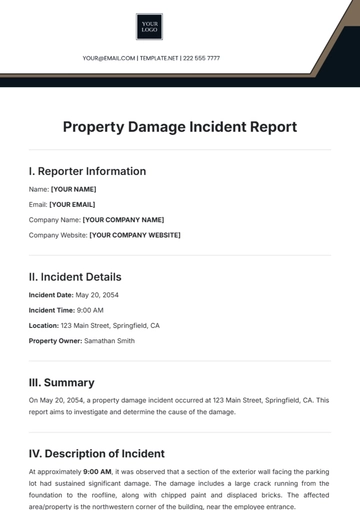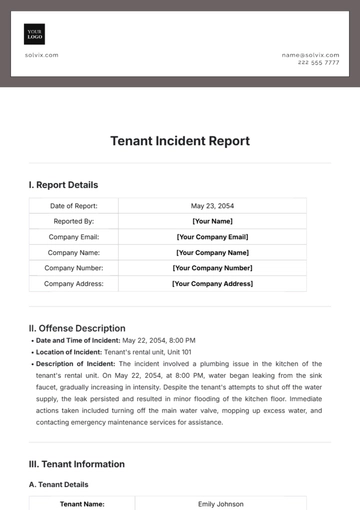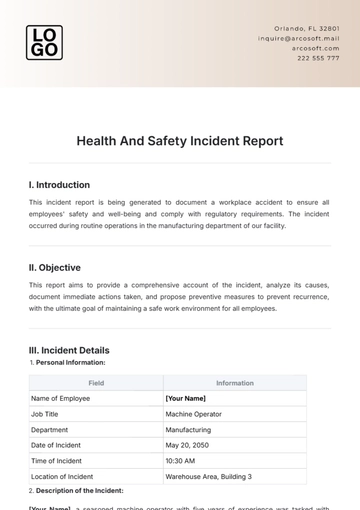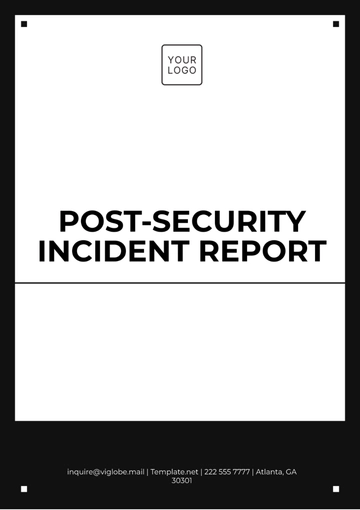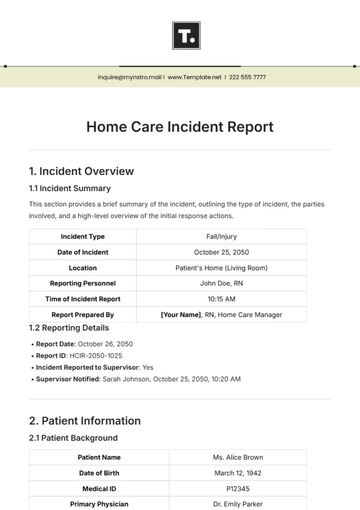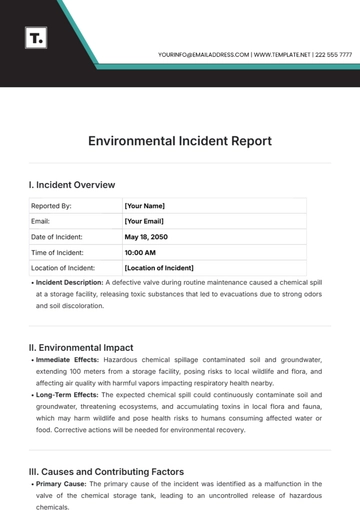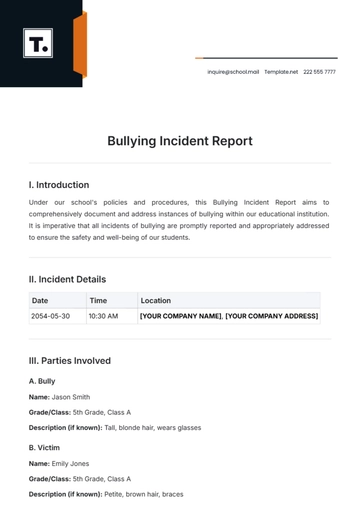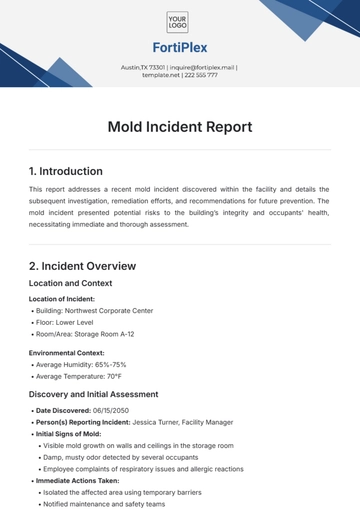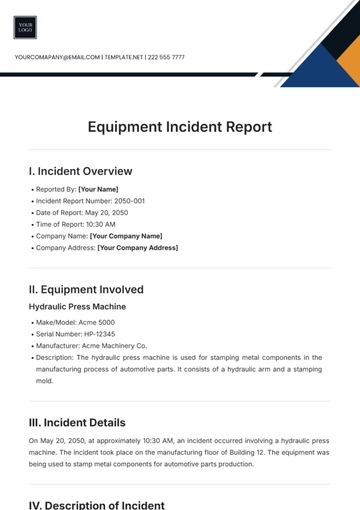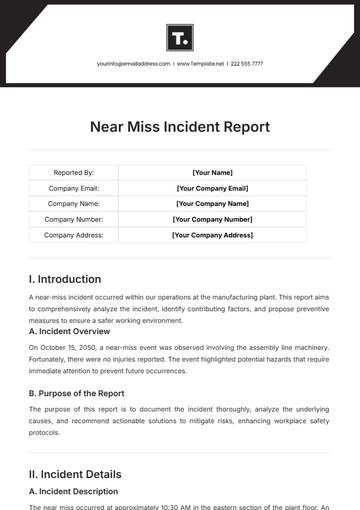Free Hospital Incident Investigation Report
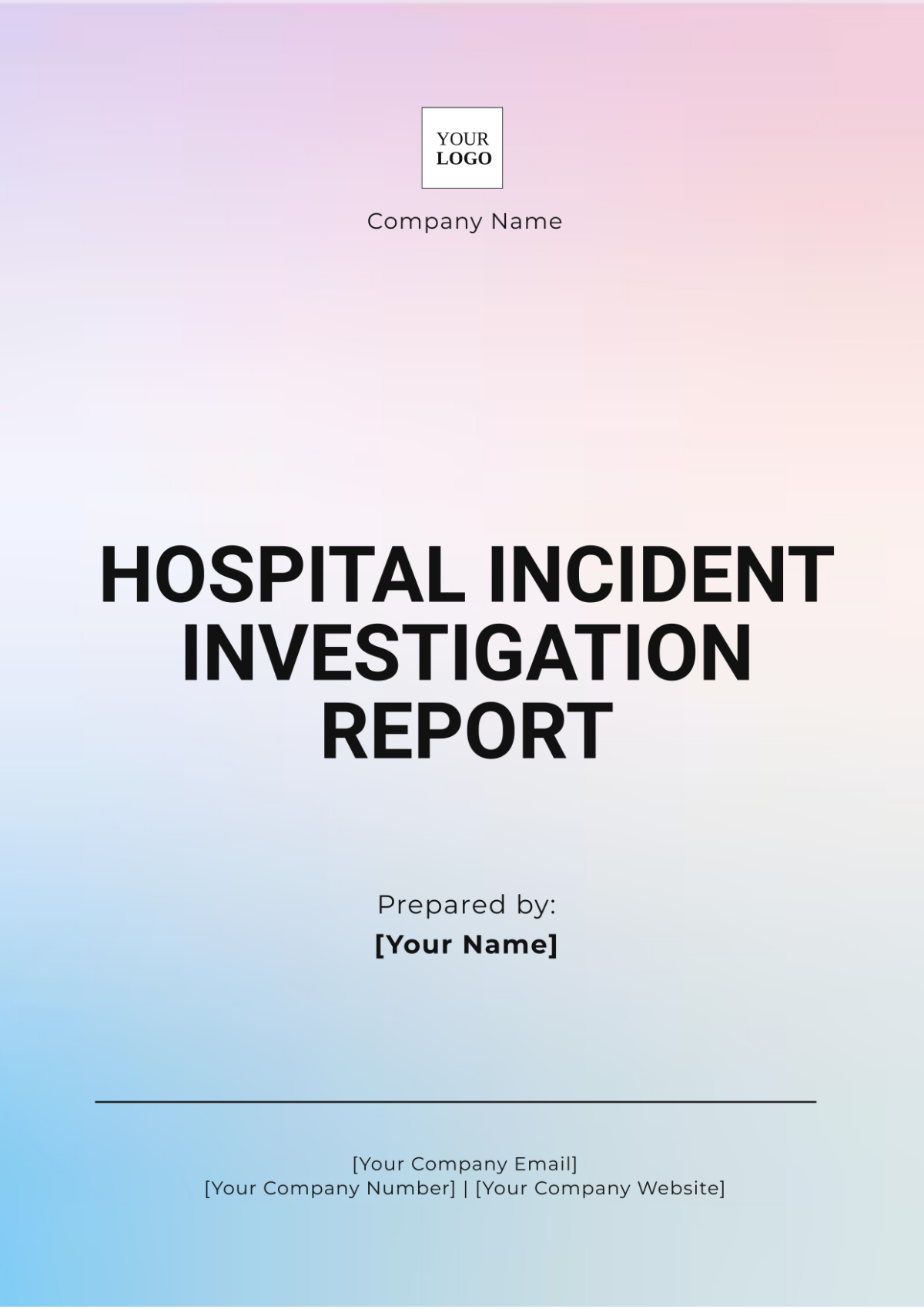
Prepared By: [Your Name]
Date: October 15, 2050
I. Introduction
This report investigates a serious incident that occurred within a healthcare facility, aiming to analyze the circumstances, identify root causes, and recommend strategies for improvement. By reviewing medical records, conducting staff interviews, and assessing emergency response protocols, the report seeks to enhance understanding of the complexities in healthcare delivery. Ultimately, the goal is to improve practices and patient outcomes in the future, fostering a culture of continuous improvement within the organization.
II. Incident Overview
On October 3, 2050, at approximately 9:15 AM, a significant incident occurred in the Emergency Department. This report provides a comprehensive investigation of the events, causes, and responses associated with the incident, aiming to prevent similar occurrences in the future.
III. Incident Details
A. Description of the Event
The incident involved the sudden collapse of a patient in the emergency department's waiting area. Emergency protocols were immediately initiated by the medical team. Despite their efforts, the patient was declared deceased at 9:45 AM.
B. Initial Response
Upon the patient's collapse, the following actions were taken:
The Emergency Medical Team was alerted and responded within two minutes.
Cardiopulmonary resuscitation (CPR) was initiated immediately.
A defibrillator was used after confirming cardiac arrest.
The patient's family was informed about the incident.
IV. Investigation Findings
A. Cause of Incident
The investigation revealed that the incident was caused by an acute myocardial infarction (heart attack). The patient had a history of coronary artery disease, which contributed to the event.
B. Contributing Factors
Several contributing factors were identified:
Pre-existing medical conditions of the patient.
Delayed medical attention due to the initial underestimation of the severity of symptoms.
High patient volume in the emergency department, leading to increased waiting times.
C. Staff Performance
The staff response was evaluated as follows:
Staff Member | Role | Performance |
|---|---|---|
Attending Physician | Attending Physician | Quickly initiated emergency protocols and effectively guided the resuscitation efforts. |
Registered Nurse | Registered Nurse | Provided immediate assistance and administered CPR efficiently. |
Paramedic | Paramedic | Operated the defibrillator and supported the team throughout the process. |
V. Recommendations
To prevent similar incidents in the future, the following recommendations are proposed:
Implement a rapid triage system to prioritize patients with potential cardiac symptoms.
Provide regular training for staff on recognizing and responding to cardiac emergencies.
Increase the number of medical personnel during peak hours to reduce patient waiting times.
Enhance patient monitoring systems in the waiting area to detect emergencies promptly.
VI. Conclusion
This incident underscored the critical importance of prompt medical attention and effective emergency response in the healthcare setting. While the staff performed admirably under pressure, systemic improvements are necessary to ensure swift and accurate medical diagnoses and responses in future emergencies.
All recommendations will be reviewed by hospital leadership, and appropriate measures will be implemented to enhance patient safety and care quality.
- 100% Customizable, free editor
- Access 1 Million+ Templates, photo’s & graphics
- Download or share as a template
- Click and replace photos, graphics, text, backgrounds
- Resize, crop, AI write & more
- Access advanced editor
Ensure comprehensive documentation of incidents in healthcare settings with the Hospital Incident Investigation Report Template from Template.net. This editable and customizable template provides a structured format for detailing incidents, causes, and corrective actions. Its user-friendly design allows healthcare professionals to adapt the content to meet specific needs, promoting clarity and thoroughness. Create professional reports that enhance accountability and improve patient safety with this essential investigative resource.
You may also like
- Sales Report
- Daily Report
- Project Report
- Business Report
- Weekly Report
- Incident Report
- Annual Report
- Report Layout
- Report Design
- Progress Report
- Marketing Report
- Company Report
- Monthly Report
- Audit Report
- Status Report
- School Report
- Reports Hr
- Management Report
- Project Status Report
- Handover Report
- Health And Safety Report
- Restaurant Report
- Construction Report
- Research Report
- Evaluation Report
- Investigation Report
- Employee Report
- Advertising Report
- Weekly Status Report
- Project Management Report
- Finance Report
- Service Report
- Technical Report
- Meeting Report
- Quarterly Report
- Inspection Report
- Medical Report
- Test Report
- Summary Report
- Inventory Report
- Valuation Report
- Operations Report
- Payroll Report
- Training Report
- Job Report
- Case Report
- Performance Report
- Board Report
- Internal Audit Report
- Student Report
- Monthly Management Report
- Small Business Report
- Accident Report
- Call Center Report
- Activity Report
- IT and Software Report
- Internship Report
- Visit Report
- Product Report
- Book Report
- Property Report
- Recruitment Report
- University Report
- Event Report
- SEO Report
- Conference Report
- Narrative Report
- Nursing Home Report
- Preschool Report
- Call Report
- Customer Report
- Employee Incident Report
- Accomplishment Report
- Social Media Report
- Work From Home Report
- Security Report
- Damage Report
- Quality Report
- Internal Report
- Nurse Report
- Real Estate Report
- Hotel Report
- Equipment Report
- Credit Report
- Field Report
- Non Profit Report
- Maintenance Report
- News Report
- Survey Report
- Executive Report
- Law Firm Report
- Advertising Agency Report
- Interior Design Report
- Travel Agency Report
- Stock Report
- Salon Report
- Bug Report
- Workplace Report
- Action Report
- Investor Report
- Cleaning Services Report
- Consulting Report
- Freelancer Report
- Site Visit Report
- Trip Report
- Classroom Observation Report
- Vehicle Report
- Final Report
- Software Report
